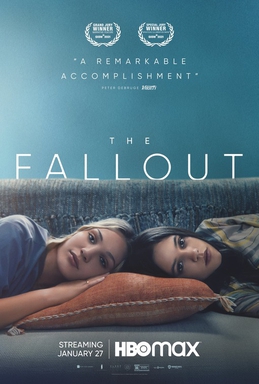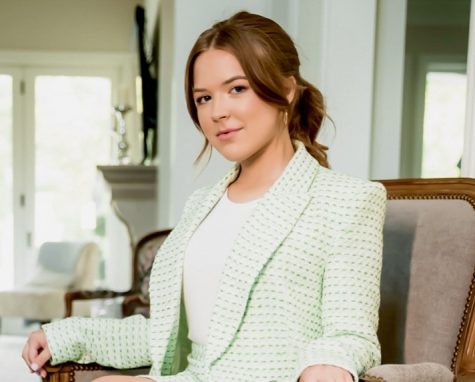Content warning: school shootings and gun violence
Contains spoilers
For decades, high schoolers have been overwhelmed with the pressures of academics, social lives, mental health and discovering their identities within a safe scholastic setting. For Gen Z, the high school experience still includes every prior focus, as well as the ever-present anxiety of survival at school.
Megan Park’s directorial debut, “The Fallout,” (2021) released on global streaming service HBO Max on Jan. 27, 2022. “The Fallout” had an auspicious premiere at the 2021 South by Southwest film festival and has since been regarded as “The first defining movie of Gen Z.”
Following 16-year-old Vada Cavell, played by Jenna Ortega, the film depicts traumatic emotional recovery following a school shooting. In just 10 minutes, Vada’s ordinary morning transforms into the nightmare-come-true that consumes so many high schoolers’ minds.
She is in the bathroom with Mia Reed, played by Maddie Ziegler, a girl she hardly knows, when they hear the first shot and accompanying screams. At the second shot, the two bolt into an empty stall and instinctively perch on the toilet so their feet cannot be seen. Shoes are thrown into the bowl. Vada sends one final text.
It is just like every drill for this devastatingly preventable – yet persistent – American tragedy, but this time, nobody knows how, when or if it will end.
Even if they screamed out loud, their cries would not be heard over the seemingly endless gunfire and shouts echoing through the hallways. When a stranger bursts into the bathroom, the girls truly anticipate their deaths but instead discover Quinton (Niles Fitch): a shocked, blood-soaked student whose brother was killed moments before. As sirens approach, the three huddle in the tiny stall and share this permanently scarring memory.
The final shot of the exposition pans from jet black patrol cars to an American flag blowing knowingly in the wind.
The intense metaphor behind this proud symbol of liberty reminds the audience that this is modern America: where the right to bear arms is prioritized before the freedom to learn – let alone the freedom to live.
In an hour and a half, Park vividly exemplifies the eternal effects of a two-minute attack. After sharing such a deeply traumatic morning with Mia and Quinton, Vada forms a powerful bond with each, finding unexpected solace in these prior strangers.
Simultaneously, she isolates herself from her parents and shuts out her earnest younger sister Amelia (Lumi Pollack). Her relationship with her best friend Nick (Will Ropp) diverges when he seeks closure through activism she is not emotionally ready to engage in. Survivor’s guilt forces her to question why and if she deserves to live.
Vada copes through distraction; it is relatable for a young audience as she slips in and out of temporary bliss. While the drama was written to convey the previously described teenage nightmare, Park does not neglect to include moments of what should be the “teenage dream.” From utilizing Ziegler’s background in dance to hiring contemporary composition legend Finneas O’Connell to set the vibrant score, the film radiates youthful energy.
In addition, the brilliantly written dialogue stands out as an integral part of this movie’s success. While too many high school films trudge through comedy written by ancient alumni, Park’s assessment feels fresh and lived. Vada and Nick’s car ride banter, Amelia’s cheeky yet curious middle school commentary and Vada’s moments with her parents – both good and bad– are genuine.
For a film to so rawly represent a modern audience, genuineness is necessary.
While Hollywood notoriously leans toward casting adult actors as high schoolers, both female leads were played by 19-year-olds. For a young audience, this only added to the already honest narrative’s portrayal of the modern high school experience.
Senior Jake Dolphin enjoyed the film and shared, “I think the most relatable part about Vada is the fact that she feels overwhelmed by the expectations of her peers and family, [but] I like the relationship between Vada and Mia. In the beginning of the movie, Vada was clearly judging Mia for who she thought she was. Then throughout the movie as their friendship grows, those assumptions disappear.”
By the movie’s conclusion, Vada has endured a treacherous emotional journey with the audience at her side. After hitting rock bottom and digging deeper still, she eventually reaches a light at the end of the tunnel.
However, in the film’s final moments, Vada is thrust into anxiety again after receiving a notification of yet another American school shooting and 12 dead students. Parallel to the exposition, the camera pans to a cloudless sky, and the audience is left with her spontaneous hyperventilating and broken breathing.
A devastatingly truthful description by The Michigan Daily stated, “In an ideal world, ‘The Fallout’ wouldn’t exist. In our world, it has to.”
Ignoring the harsh reality of gun violence in the United States is not going to keep it from enduring; maintaining the conversation is necessary for any kind of hopeful, safe future. As school shootings and their painful aftermath emerge in pop culture and the media, they continue to spread awareness.
Dolphin described, “I feel like school shootings have gone through the media cycle and aren’t being talked about nearly as much as they were two years ago. I don’t know if right now Gen Z has the power to put a total end to school shootings; however, in the future, when Gen Z can hold power in the office, I think there will be change,” Dolphin concluded.
While films like “The Fallout” may be triggering or difficult for some audiences to sit through emotionally, they act as shoes for viewers to walk in to understand the consequences of a very relevant, recurrent modern tragedy.
Vada – like millions of students across the United States who have experienced the intense trauma of school shootings both first and secondhand – will never be at peace until permanent change is made to prevent mass shootings from ever happening again. Park’s “The Fallout” is a gripping period piece, call to action and catalyst for someone, anyone, to make change.









